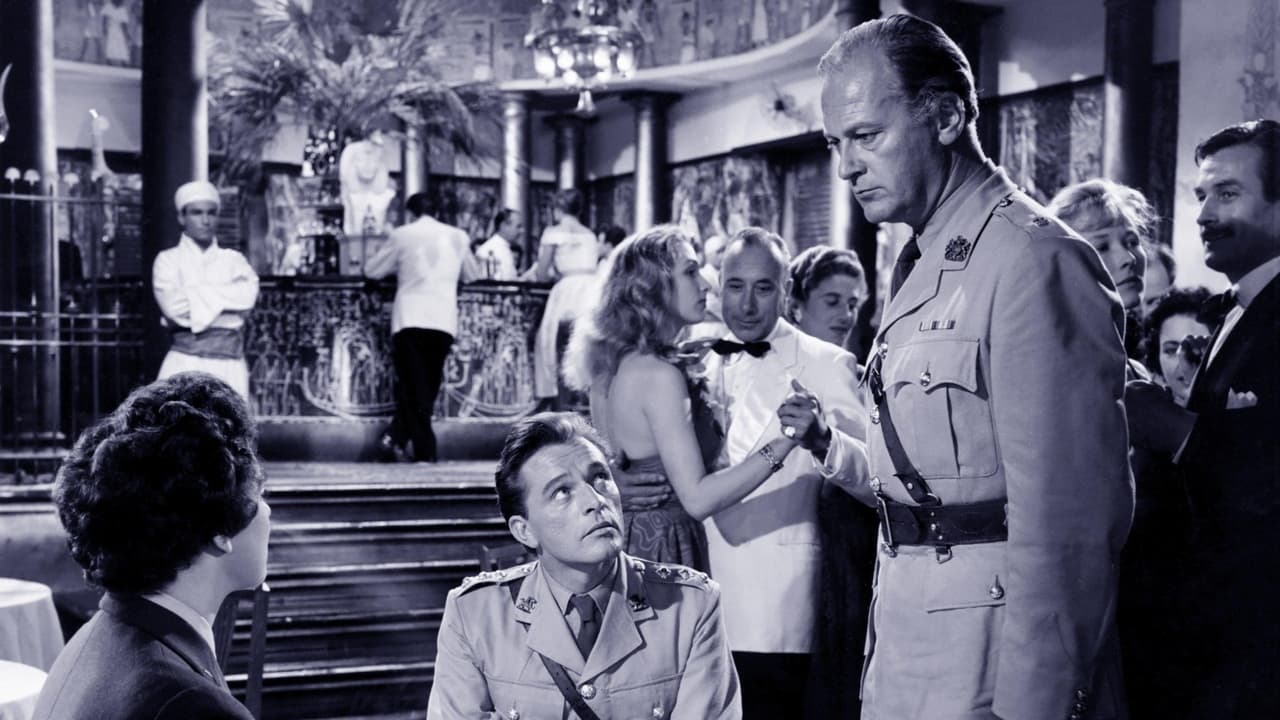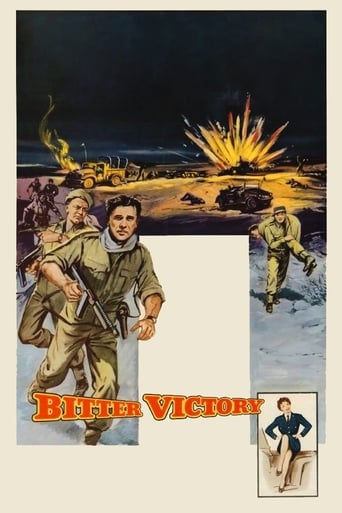SeeQuant
Blending excellent reporting and strong storytelling, this is a disturbing film truly stranger than fiction
Keira Brennan
The movie is made so realistic it has a lot of that WoW feeling at the right moments and never tooo over the top. the suspense is done so well and the emotion is felt. Very well put together with the music and all.
Skyler
Great movie. Not sure what people expected but I found it highly entertaining.
Fleur
Actress is magnificent and exudes a hypnotic screen presence in this affecting drama.
HotToastyRag
For 1957, Bitter Victory is a pretty graphic war movie. It's filmed in black and white, but bloodstains and bullet holes are shown, deaths are prolonged, and the suspense of war is captured well.Curd Jurgens plays an officer in charge of a mission to German-controlled Benghazi during WWII. His second-in-command is Richard Burton, and since Burton is in love with Jurgens's wife, they don't have a very good working relationship. As interesting as this dynamic is, on and off the battlefield, the war scenes are where this movie really shines.This is not your typical WWII movie where one randomly fired gun makes the bad guy fall over, and the good guy comes home with a tiny scratch on his forehead as a battle scar. These men are out in the desert, delirious from heat and dying from dehydration, unfamiliar with the terrain, fighting men, scorpions, and the sun, and forced to face worse situations than they thought possible. I won't spoil anything, but there's a very intense scene in which one soldier is dying and another soldier has to decide whether to shoot him and put him out of his misery or let him die a slow, painful death. Those scenes weren't generally filmed in 1957! If you're used to lots of blood and torture in your war movies, you won't find this movie very exciting. But for a tasteful, classic war movie, it's very good. It's one of the best war movies I've seen. Plus, Richard Burton looks so incredibly handsome in his uniform. Ladies, you'll definitely want to check this one out.
MartinHafer
This film made a very odd casting decision. For some reason, the German actor Curt Jurgens was hired to play one of the leads...a British major serving in WWII! He doesn't sound the least bit British and this took me out of the film a bit. The other lead was Richard Burton....a man who grows to hate and have contempt for the major during the course of their suicide mission. This is because although the Major was in control of the mission, he is a coward and hesitates when they need to act. And, it appears that the Major might just be trying to get the Captain (Burton) killed off so that no one will know about his failings as a leader.An interesting portrait of humans in war, it's worth seeing but isn't a great war film. By the way, there was one scene that annoyed me. The Captain is bitten by a scorpion and INSTANTLY everyone thinks he will die. Death from scorpion stings is VERY rare and only about 2% of all scorpion species MIGHT be able to kill you...and mostly if your system is already compromised. And, just like snakebites, you DO NOT cut the wound to suck out the poison!!! Kids...don't try this at home!!!
dbdumonteil
Two errors in the cast:French actor Raymond Pellegrin is not credible as an Arab scout ,at least to French eyes;Ruth Roman is too cold to portray a Ray heroine successfully ;Hitchcock ,in Truffaut/Hitchcock ,said the same about her in "strangers on a train" .But it does not matter because it's a man's movie .It is curious to have cast Jurgens as an South African officer but his playing opposite a young Burton is quite efficient.The cast and credits had warned us : the enemy you fight is not the one you think of .The last scene clinches it ,when the medal amounts to nothing.This is not Ray's best film ,but it is probably his most violent one : Burton saving the dead and killing the living is impressive ;Jurgens eaten with jealousy and hatred watching the scorpion..Compare the death of Burton with that of Burl Ives in "winds across the everglades" ,the follow-up to "bitter victory" .The strange ancient city in the middle of the desert is an exact equivalent of the planetarium in "rebel without a cause" : those walls still standing and those stars in the sky will survive our little wars ,our glorious (or bitter) victories or our growing up angst.
zardoz-13
"Flying Leathernecks" helmer Nicholas Ray, the justifiably celebrated auteur of meaningful films such as "Rebel Without A Cause," "In A Lonely Place," and "Johnny Guitar," allows sudsy melodrama, pretentious writing, and ponderous pacing to sabotage his seldom exciting and altogether tedious World War II epic "Bitter Victory." The miscast but amenable Teutonic star Curd Jurgens of "The Enemy Below" and Welshman Richard Burton of "Where Eagles Dare" embark on a last-minute mission to raid Field Marshal Erwin Rommel's Africa Korps headquarters in Benghazi and snatch valuable Nazi documents. Meanwhile, the supporting cast contains future Hammer icon Christopher Lee as a British sergeant and top-flight supporting actor Nigel Green who appeared as a sly officer in Arthur Hiller's World War II thriller "Tobruk." Indeed, the semi-cynical "Bitter Victory" paved the way for Andre De Toth's "Play Dirty" (1968) to issue its full-throttle anti-war sentiments. Unfortunately, "Bitter Victory" generates modest excitement for a war movie. Ray handles the raid efficiently enough without any gratuitous gore and/or bloodshed, but he spends most of the time with the British survivors as they trudge through the desert arguing their separate philosophies about murder, morality, and war..The British plan a raid behind enemy lines on Rommel's HQ to obtain vital information, but General Patterson (Anthony Bushnell of "The Red Beret") objects to the timetable. "I can't be expected to find the right man for this at twenty minutes notice." He selects Major Brand to lead the commandos. Brand is a professional soldier with fifteen years of military service and commando training. Brand's chief drawback, however, is he has been behind a desk for that decade and a half and never tasted combat. Reluctantly, Patterson also chooses a younger officer as Brand's second-in-command. Captain Leith knows the Libyan Desert from his pre-war years as an archaeologist. Leith has lived with the Arabs and speaks their language. Initially, the ill-mannered Leith grates on Patterson's nerves when he regards the operation as "very difficult" and gives it a "one in a million" chance to succeed. Nevertheless, Leith confides in Patterson's subordinate that he wants to go on the mission.The primary trouble between Brand and Leith involves the sudden appearance of Brand's wife. Jane Brand (Ruth Roman of "Ladies Courageous") picks the wrong time to show up and kindle jealousy between her husband and her former lover. You see, Jane was dating Leith regularly before she married Brand. The Leith & Jane romance ended abruptly when Leith left her standing in front of the British Museum and went to Libya without a word, as when Bergmann abandoned Bogart "Casablanca" in the rain at the train station. Jane accuses Leith of 'cowardice' for leaving her. Leith replies, "All men are cowards, in some way." Anyway, Brand is jealous of his subordinate officer whom he believes his wife displays more affection for in public. Interestingly, Burton replaced Ray's original choice for the role--Montgomery Clift. Later, Leith makes the ironic remark: "I kill the living and save the death." Friction arises between them because neither respects the other.During the traditional briefing scene around a model of Rommel's HQ, the men learn two planes will transport them near their objective. They will bail out and then they will march three hours to their destination. They will split into two groups and launch their attack. Ray doesn't show them parachuting from the plane. We hear the sounds of the planes flying away as the men collect their parachutes. Everything goes according to plan as our heroes slip into Nazi-held Benghazi at night disguised as Arabs. Once they reach the German occupied town, things go sour as Brand cannot stab a German guard and Leith performs the chore himself. Leith, from this moment on, criticizes Brand for his cowardice. The entire raid lasts approximately 5 minutes with another 5 minutes dispatching the Germans in pursuit. Our heroes capture a German colonel, and Brand orders Leith to remain behind with the wounded. The virus of mistrust and no respect infects the rest of the commando regiment, especially a wise-acre soldier, Private Wilkins (Nigel Green of "The Ipcress File") who exploits his skill as a safecracker to burglarize the German safe housing the documents. Three British soldiers are casualties of the commando raid, and things soon fall apart. Brand leaves Leith behind to care for two wounded soldiers. Eventually, Leith kills a wounded German, but he cannot kill the wounded Englishman. Instead, he loads the dying man on his back and marches away to catch up with Brand. The soldier curses Leith for being a coward and not killing him. The man that Leith carries dies from his wound. Leith chuckles ghoulishly when he learns about the dead man and observes, "I kill the living and save the dead." After Leith reunites with Brand and the men, he is bitten by an scorpion. Brand could have warned him, but he refused to for fear that Leith would expose him once they returned to camp as a coward.Altogether, admirable as it is, "Bitter Victory" is a bit too bitter for my taste. The setting and the storyline about one British officer willing to kill or let another British officer die is clearly ahead of its time. The British maintained a stiff upper lip in the presence of movies like "Bitter Victory" and the far superior but historically inaccurate "Bridge on the Rive Kwai." "Bitter Victory" lacks the one quality that "Kwai" boasted: it was an artistic masterpiece. "Bitter Victory" has languished too long, but despite its poignant message, quotable dialogue, and top-notch performances, this is simply lukewarm. As a point of reference, "Bitter Victory" with contentions among its Allied heroes predated Raoul Walsh's adaptation of Norman Mailer's "The Naked and the Dead" that appeared a year later in 1958. Although I am no champion of this movie, "Bitter Victory" deserved better treatment from Columbia in this DVD release. Hopefully, perhaps, Criterion will intervene for the sake of Nicholas Ray's memory.

